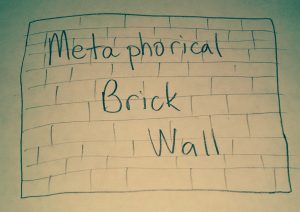 “I have a brick wall. In fact, I have many brick walls.”
“I have a brick wall. In fact, I have many brick walls.”
“There’s no such thing as brick walls. They are all in your head.”
It does not matter whether you think genealogical brick walls exist or whether you think they don’t. It doesn’t. What matters is how you approach your research when you think you are at one or when you think “if I believed in them, this would be one, but I don’t so it’s not.”
The problem is that research difficulties are not always solved by the exact same approach. Problems are contextual. What worked with one family may not work with another. That’s often why people feel they have reached an impasse in their research: they have a type of problem they have never encountered. They are experiencing a stumbling block they’ve never experienced before. If we continue the brick wall metaphor, then it’s possible that the best solution is:
- scaling the wall with a ladder
- digging under the wall
- flying over the wall
- breaking a hole in the wall
- realizing the wall is just made of paper and punching through it
- realizing the wall is simply a really big spot on your glasses
- going to the end of the wall and walking around
- etc.
Different solutions for different problems.
That’s true even if one does not believe in brick walls.
What matters is that you realize a new approach may be necessary. Your metaphor for this stage of the research can be “I’m stuck in the ditch and spinning my wheels.” And if that’s your metaphor someone is bound to say “That doesn’t really work because genealogy is not like driving a car at all. You really need to get a new metaphor.”
No you don’t. Your metaphor tells you that there’s a time when you need to stop spinning your wheels and do something else.That’s good. The brick wall metaphor tells you that you’ve got something blocking your path that you need to work around. Telling yourself that you are clueless about what to do next is another appropriate response.
What matters is realizing that something else needs to be done and a new approach is necessary.
Generally speaking, that means learning about:
- all contemporary records that were kept at all political levels–how they were recorded, who was included, how they were maintained, how they are accessed, how to interpret them, etc.
- all contemporary private records (including church records)–how they were recorded, who was included, how they were maintained, how they are accessed, how they are interpreted, etc.
- all contemporary historical events that logically and directly (or indirectly) impacted your person of interest
- the “neighborhood” in which your person of interest lived–his neighbors, the physical nature of his neighborhood, his social neighborhood (kinfolk, etc.), his culture, and so on
- research methods appropriate to the time period and location
It also means:
- stating, analyzing, and questioning all assumptions about the ancestor
- reviewing old conclusions and document transcriptions for thoroughness, accuracy, and completeness
- questioning statements about the ancestor made by other researchers
- being willing to admit you were wrong
- being willing to admit there may be something you need to learn
- realizing that a cookie cutter approach may not work
The metaphor does not really matter.
What does matter is how you approach your research when you’ve reached that metaphor.

7 Responses
“The definition of insanity is doing the same thing over and over and expecting a different result.”
This is true. Sometimes I am amazed at how many people do that 😉
You gave me a thought I hadn’t considered. What was happening in 1759 in Massachusetts. Well, maybe the unknown father was involved in the French and Indian War. I think it’s worth a shot, since other trials aren’t working. I also want to locate any personal records of Rev. Noah Alden, Baptist pastor in Bellingham Massachusetts during my time period. I need to do those two things next!
(on Google Books site)
“Annals of the American Pulpit: Baptist”
By William Buell Sprague
enter “Noah Alden” into “search inside”
You nailed it. Sometimes I’m not sure if I truly believe the answer is out there somewhere, if I could just look in the right place, or if I am just too crazy and stubborn to give up.
[…] John Neill at Rootdig,com asks Are There Really Genealogy Brick Walls? He claims that what matters is how you approach your research when you think you are at a […]
I’ve been working on a couple for 20 years. While I’ve made some progress, I doubt I will ever know the details of their lives and deaths. The records simply aren’t there – never created. There wasn’t a local government available to require them at the time, so no births or deaths were recorded, neither was buried in a cemetery, newspapers didn’t start in the area until 15-20 years after they died, churches were in private homes, and neither had a will. It’s frustrating. I’ve pretty much given up.